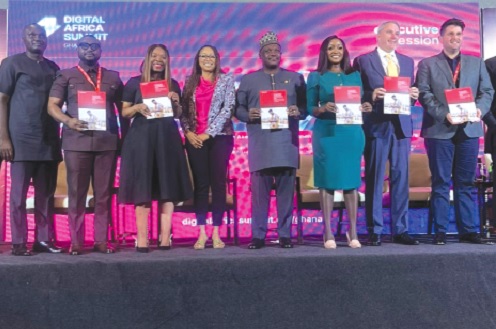Ghana can unlock more than GH¢40 billion in new economic value by 2029 if bold digital reforms are implemented across key sectors, a new report by the Global System for Mobile Communications Association (GSMA) has revealed.
The report, launched in Accra yesterday, Wednesday, September 3, 2025 at the Digital Africa Summit Ghana, highlighted that digitalisation held the potential to transform agriculture, industry, trade, transport, and public services, creating nearly half a million jobs while boosting government revenue.
According to the analysis, agriculture alone could gain GH¢10.5 billion in value addition, while the industrial sector could contribute GH¢15 billion.
Additional gains projected were trade (GH¢5.1 billion), transport (GH¢4.3 billion) and improved digital government services (GH¢5.8 billion).
In addition, it projected that the nation could create nearly 450,000 new jobs by 2029 if digital reforms were fully implemented. These include about 190,000 in agriculture, 110,000 in industry, 80,000 in transport and 60,000 in trade.
Recommendations
The report titled “Driving Digital Transformation of the Economy in Ghana”, further stated that in spite of the near-universal 3G and 4G network coverage, only 37 per cent of the population currently used mobile Internet, leaving a 62 per cent usage gap.
It recommended reducing sector-specific mobile taxes, publishing a 5G spectrum road map, enforcing technology-neutral licences, reforming the Universal Service Fund, promoting device affordability, expanding digital skills training, accelerating e-government and modernising regulation to support innovation, strengthen investment and enhance adoption of emerging technologies across the nation’s economy.
The Digital Africa Summit Ghana featured an executive session and panel discussions which explored the most pressing issues and opportunities shaping the continent’s digital future - infrastructure investment and policy innovation to AI, connectivity and digital inclusion.
Current reforms
The Minister of Communication, Digital Technology and Innovations, Samuel Nartey George, underscored deliberate reforms driving the country’s digital economy.
He mentioned spectrum release, e-levy removal and technology neutrality as pivotal for competition and innovation.
Ongoing efforts include rural fibre expansion, reduced data costs, and the One Million Coders programme, which had already attracted 90,000 applicants, with 52 per cent being women.
The minister announced 15 draft legislations covering AI, cybersecurity, data protection and start-ups, stressing five levers: affordable connectivity, digital skills, financial inclusion, trust frameworks and government-driven demand for local innovations.
“These are the foundations for growth. Without them, technology remains theoretical and we will not see its performance,” he said.
Mr George further underscored the need to assemble devices locally to make smartphones affordable, create jobs and help close the country’s 62 per cent digital divide, because the high cost of imported handsets remained a major barrier to connectivity.
Removing inefficiencies
The Head of GSMA Africa, Angela Wamola, stressed that the model of using technology to boost productivity applied across all sectors of the country’s economy.
Citing agriculture, she explained that digital tools such as precision farming, market insights and weather data could significantly increase yields and incomes for millions of farmers.
She added that the same principle applied to transport, where inefficiencies at ports and along logistics chains raised costs by as much as 25 per cent.
By leveraging technology, sensors and IoT solutions, Ms Wamola said the nation could cut such costs, unlock greater revenues, and ultimately boost government tax collections.

